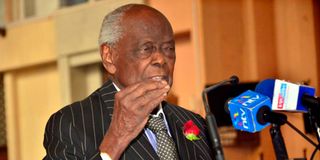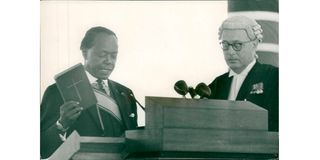How Charles Njonjo made Moi VP during limo ride with Kenyatta

Former Attorney General the late Charles Njonjo.
The late Charles Njonjo, who was the only surviving member of Kenya’s first Cabinet, wielded immense powers during his reign as a Cabinet Minister for Constitutional Affairs in President Daniel Moi administration in the 1980s.
He died on today, Sunday January 2, 2022 aged 101.
Fondly known as the Duke of Kabeteshire due to his unusual English mannerisms, Mr Njonjo served as the country’s first Attorney General between 1963 and 1979 before retiring at the age of 60.
He took over the position of Attorney General (AG) from Eric Griffith Jones who served under the British administration.
According to the publication Kenya Yearbook Editorial Board, so powerful was the late Njonjo that during his reign as the country’s AG, he would often ride in the limousines of both presidents Kenyatta and Moi and also played a key role in the selection of ministers, ambassadors and other key members of government.
To underscore the power that Mr Njonjo wielded in the political sphere, it is reported that it is he who recommended the late Moi to be appointed as Kenya’s third vice president following the resignation of Joseph Murumbi.
“As we drove one day in the presidential limousine from some town in the Rift Valley after Murumbi had resigned as Vice President, Mzee wondered loudly whom he would appoint to replace Murumbi. Then Kenyatta asked me: ‘Who do you have’? To which I replied, ‘How about Moi’?” Njonjo recalled in one of his interviews.
According to him, Kenyatta was so pleased with this proposal that he appointed Moi as VP the following day.
Many regarded Njonjo as the second powerful man after the late President Moi.

Former Attorney General Charles Njonjo takes oath of office soon after independence.
For instance, during his 17-year stint at Sheria House as AG, Njonjo occasionally shocked the nation by expressing views that were opposed to the country’s foreign policy or even that of the Organisation of African Unity (OAU) – not to mention prevailing local sentiments.
Then there is the small matter of his role in the fall of the original East African Community in 1977.
In February 1977, Tanzania had closed its border with Kenya – and Kenya had also taken off with some of the Tanzanian assets.
Man eat nothing society
To Julius Nyerere, Kenya had turned to a “man eat man society” - a remark that elicited a retort from Attorney General Charles Njonjo who called Tanzania a “man eat nothing society.”
Njonjo wanted the East African Community (EAC) to die. And as a member of Jomo Kenyatta’s kitchen cabinet, he worked hard to kill it.
And when the EAC broke in June 1977, Njonjo headed to Norfolk Hotel, ordered five champagnes, to toast its death.
“We threw a party,” Njonjo once told Nation.Africa a few years ago, still excited that EAC died.
At some point during his tenure, the late Njonjo negotiated the Israeli military raid on Entebbe airport in Uganda to free Israeli hostages held by terrorist aeroplane hijackers.
He was also opposed to the existence of the original tribal grouping known as the Gikuyu, Embu and Meru Association (Gema) which he had registered in 1971 and thereafter sought to proscribe in 1976.
Proximity to power
In Parliament, Mr Njonjo was feared and loved in equal measure by his colleagues because of his proximity to power and they believed that he had access to classified information.
However, those who loathed him associated him with the late President Moi’s excesses including the arrests and torture of perceived dissidents and detentions without trial.
On the floor of the House, Mr Njonjo met stiff opposition from a group of seven young and highly intelligent MPs, namely Koigi wa Wamwere, Mashengu wa Mwachofi, James Orengo, Chelagat Mutai, Abuya Abuya, Onyango Midika and Lawrence Sifuna due to the perception that he was misadvising Moi to brutalise his opponents and to implement tough government policies.
President Uhuru Kenyatta in his eulogy message termed the death of Mr Njonjo a huge blow to the country.
“The passing away of Njonjo is a big blow not only to his immediate family, friends and relatives but to all Kenyans and indeed the entire African continent because of his leading role in the founding of the Kenyans nation at independence,” President Kenyatta said in his Eulogy message.





